《大学英语语法》课件—04Modifiers:Adverb
- 格式:ppt
- 大小:345.00 KB
- 文档页数:21
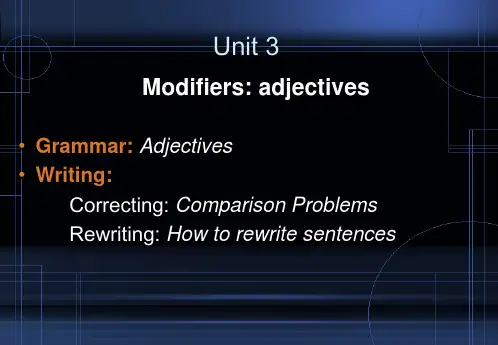
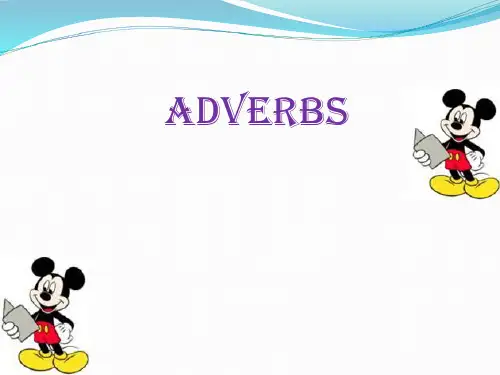
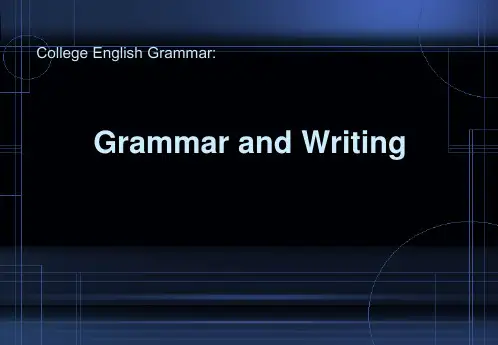
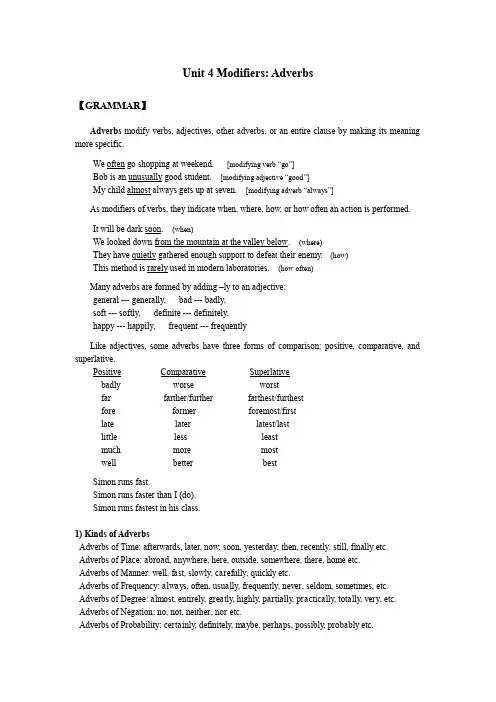
Unit 4 Modifiers: Adverbs【GRAMMAR】Adverbs modify verbs, adjectives, other adverbs, or an entire clause by making its meaning more specific.We often go shopping at weekend. [modifying verb “go”]Bob is an unusually good student. [modifying adjective “good”]My child almost always gets up at seven. [modifying adverb “always”]As modifiers of verbs, they indicate when, where, how, or how often an action is performed.It will be dark soon. (when)We looked down from the mountain at the valley below. (where)They have quietly gathered enough support to defeat their enemy.(how)This method is rarely used in modern laboratories. (how often)Many adverbs are formed by adding –ly to an adjective:general --- generally, bad --- badly,soft --- softly, definite --- definitely,happy --- happily, frequent --- frequentlyLike adjectives, some adverbs have three forms of comparison: positive, comparative, and superlative.Positive Comparative Superlativebadly worse worstfar farther/further farthest/furthestfore former foremost/firstlate later latest/lastlittle less leastmuch more mostwell better bestSimon runs fast.Simon runs faster than I (do).Simon runs fastest in his class.1) Kinds of AdverbsAdverbs of Time:afterwards, later, now, soon, yesterday, then, recently, still, finally etc. Adverbs of Place: abroad, anywhere, here, outside, somewhere, there,home etc.Adverbs of Manner: well, fast, slowly, carefully, quickly etc.Adverbs of Frequency: always, often, usually, frequently, never, seldom, sometimes, etc. Adverbs of Degree: almost, entirely, greatly, highly, partially, practically, totally, very, etc. Adverbs of Negation:no, not, neither, nor etc.Adverbs of Probability: certainly, definitely, maybe, perhaps, possibly, probably etc.Adverbs of Interrogative: when, where, how, why etc.Others: also, too, only etc.This is to act first and report afterwards.You will find the text somewhere in the Bible.This product sells well abroad.Sometimes I feel so worthless!Remember almost nothing happens by accident.There is no limit to practice nor to innovation.Reading for many hours will certainly tax your eyes.Flowers soon fade when cut.Also like learning English, persist makes miracles!2) Position of adverbsWhen an adverb modifies an adjective or another adverb, the modifying adverb must immediately precede the word modified.The prices are quite reasonable.We are very much hoping you can attend our wedding.When an adverb modifies a verb, it has three positions in a sentence: front (before the subject), middle (between the subject and the main verb) and end (after the verb or object).Sometimes I feel quite lonely.“Mathematics” is sometimes abbreviated to “math”.I can not sense your meaning sometimes.The adverb should not be put between the verb and the object:✈She picked up slowly the gun.She picked up the gun slowly.However, adverbs should always come after intransitive verbs (= verbs which have no object).Ill weeds grow fast.It pays to work honestly.Also, some common adverbs (well, badly, hard etc.) are almost always placed after the verb.They suffered badly during the flood.Although grumbling sometimes, he worked hard.As a general rule, it is wise to place the adverb as near as possible to the word that it modifies.He drives carefully.The party has thoroughly searched the whole cave.Adverbs of manner and place are usually put behind the direct object (or behind the verb if there's no direct object).The boy sneaked out of the house quietly.We have to walk back home.Adverbs of time are usually put at the end of a sentence but, to catch attention, you can also put them at the beginning of a sentence.She stayed in the Bears' house all day.Tomorrow I'm going to tidy my room.Adverbs of frequency are usually placed before the main verb but after auxiliary verbs (such as be, have, may, must).You must always fasten your seat belt.I have never forgotten my first kiss.3) Order of adverbsUsual word order with different adverbs is:manner + place + timeShe sang beautifully in the bathroom last night.The murder escaped quickly from the village at dusk.In actual practice, of course, it would be highly unusual to have a string of adverbial modifiers beyond two or three (at the most).As a general rule, shorter adverbial phrases go before longer adverbial phrases, regardless of content.The cat takes a walk after super every day of its life.He will wait for us at six at the west gate of the university.A second rule is that among similar adverbial phrases of kind (manner, place, frequency, etc.), the more specific adverbial phrase comes first.Mozart was born in January in 1756.They lived in a little log cabin in the mountains.Of adverbs of manner, the shorter usually comes before the longer and they are linked with each other by conjunctions such as and, but etc.Please drive slowly and carefully.She spoke fast but clearly.。




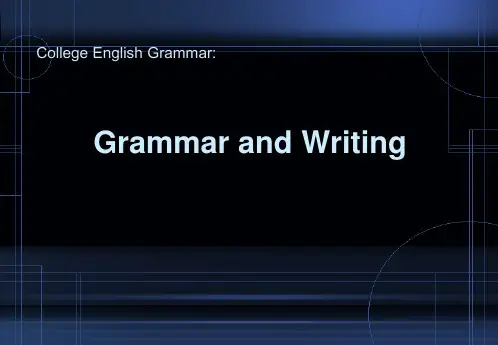
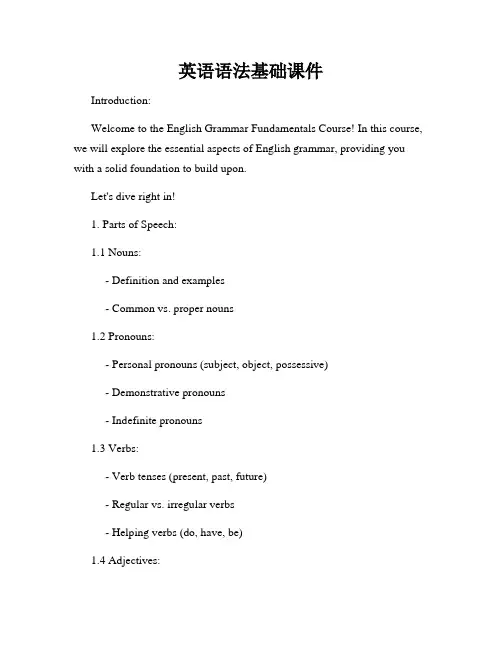
英语语法基础课件Introduction:Welcome to the English Grammar Fundamentals Course! In this course, we will explore the essential aspects of English grammar, providing you with a solid foundation to build upon.Let's dive right in!1. Parts of Speech:1.1 Nouns:- Definition and examples- Common vs. proper nouns1.2 Pronouns:- Personal pronouns (subject, object, possessive)- Demonstrative pronouns- Indefinite pronouns1.3 Verbs:- Verb tenses (present, past, future)- Regular vs. irregular verbs- Helping verbs (do, have, be)1.4 Adjectives:- Describing words- Comparative and superlative forms- Demonstrative adjectives1.5 Adverbs:- Modifying adjectives, verbs, and other adverbs - Types of adverbs (time, place, manner)- Adverbs of frequency1.6 Prepositions:- Common prepositions- Prepositional phrases- Prepositions of time and place1.7 Conjunctions:- Coordinating conjunctions- Subordinating conjunctions- Correlative conjunctions1.8 Interjections:- Expressing strong emotions- Examples and usage2. Sentence Structure:2.1 Subject and Predicate:- Identifying the subject and predicate- Simple and compound subjects2.2 Types of Sentences:- Declarative, interrogative, imperative, exclamatory- Sentence punctuation2.3 Sentence Fragments:- Recognizing and correcting fragments- Complete vs. incomplete sentences2.4 Run-on Sentences:- Understanding run-on sentences- Using punctuation or conjunctions to correct them2.5 Sentence Types:- Simple, compound, complex, compound-complex sentences - Examples and formation3. Verb Tenses:3.1 Present Tense:- Formation and usage- Present simple, present continuous3.2 Past Tense:- Formation and usage- Past simple, past continuous3.3 Future Tense:- Formation and usage- Future simple, future continuous3.4 Perfect Tense:- Formation and usage- Present perfect, past perfect, future perfect4. Sentence Agreement:4.1 Subject-Verb Agreement:- Matching singular and plural subjects with verbs- Special cases (collective nouns, indefinite pronouns) 4.2 Pronoun-Antecedent Agreement:- Matching pronouns with their antecedents- Avoiding ambiguous pronoun references4.3 Adjective-Noun Agreement:- Using adjectives correctly with nouns- Gender and number agreement5. Sentence Transformation:5.1 Active and Passive Voice:- Definitions and examples- Converting active sentences to passive and vice versa5.2 Direct and Indirect Speech:- Quoting and reporting speech- Changing tenses and pronouns in reported speech5.3 Conditional Sentences:- Different types of conditional sentences- Forming and using conditional structures5.4 Question Formation:- Yes/No questions and Wh- questions- Inversion and subject-auxiliary inversionConclusion:Congratulations! You have now completed the English Grammar Fundamentals Course. By mastering these basic grammar concepts, you are equipped to communicate effectively and confidently in English. Remember to practice regularly and apply these principles in your writing and conversation. Keep exploring and expanding your knowledge of English grammar!。
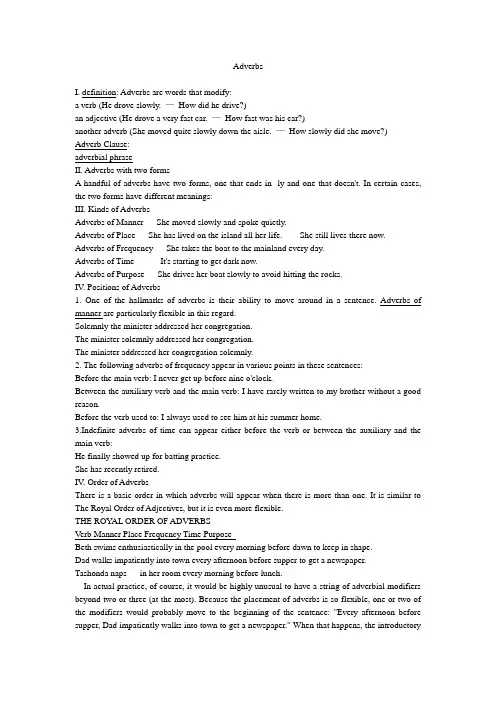
AdverbsI. definition: Adverbs are words that modify:a verb (He drove slowly. —How did he drive?)an adjective (He drove a very fast car. —How fast was his car?)another adverb (She moved quite slowly down the aisle. —How slowly did she move?) Adverb Clause:adverbial phraseII. Adverbs with two formsA handful of adverbs have two forms, one that ends in -ly and one that doesn't. In certain cases, the two forms have different meanings:III. Kinds of AdverbsAdverbs of Manner She moved slowly and spoke quietly.Adverbs of Place She has lived on the island all her life. She still lives there now. Adverbs of Frequency She takes the boat to the mainland every day.Adverbs of Time It's starting to get dark now.Adverbs of Purpose She drives her boat slowly to avoid hitting the rocks.IV. Positions of Adverbs1. One of the hallmarks of adverbs is their ability to move around in a sentence. Adverbs of manner are particularly flexible in this regard.Solemnly the minister addressed her congregation.The minister solemnly addressed her congregation.The minister addressed her congregation solemnly.2. The following adverbs of frequency appear in various points in these sentences:Before the main verb: I never get up before nine o'clock.Between the auxiliary verb and the main verb: I have rarely written to my brother without a good reason.Before the verb used to: I always used to see him at his summer home.3.Indefinite adverbs of time can appear either before the verb or between the auxiliary and the main verb:He finally showed up for batting practice.She has recently retired.IV. Order of AdverbsThere is a basic order in which adverbs will appear when there is more than one. It is similar to The Royal Order of Adjectives, but it is even more flexible.THE ROYAL ORDER OF ADVERBSVerb Manner Place Frequency Time PurposeBeth swims enthusiastically in the pool every morning before dawn to keep in shape.Dad walks impatiently into town every afternoon before supper to get a newspaper.Tashonda naps in her room every morning before lunch.In actual practice, of course, it would be highly unusual to have a string of adverbial modifiers beyond two or three (at the most). Because the placement of adverbs is so flexible, one or two of the modifiers would probably move to the beginning of the sentence: "Every afternoon before supper, Dad impatiently walks into town to get a newspaper." When that happens, the introductoryadverbial modifiers are usually set off with a comma.More Notes on Adverb OrderAs a general principle, shorter adverbial phrases precede longer adverbial phrases, regardless of content. In the following sentence, an adverb of time precedes an adverb of frequency because it is shorter (and simpler):Dad takes a brisk walk before breakfast every day of his life.A second principle: among similar adverbial phrases of kind (manner, place, frequency, etc.), the more specific adverbial phrase comes first:My grandmother was born in a sod house on the plains of northern Nebraska.She promised to meet him for lunch next Tuesday.Bringing an adverbial modifier to the beginning of the sentence can place special emphasis on that modifier. This is particularly useful with adverbs of manner:Slowly, ever so carefully, Jesse filled the coffee cup up to the brim, even above the brim. Occasionally, but only occasionally, one of these lemons will get by the inspectors.V. Inappropriate Adverb OrderReview the section on Misplaced Modifiers for some additional ideas on placement. Modifiers can sometimes attach themselves to and thus modify words that they ought not to modify.They reported that Giuseppe Balle, a European rock star, had died on the six o'clock news. Clearly, it would be better to move the underlined modifier to a position immediately after "they reported" or even to the beginning of the sentence —so the poor man doesn't die on television. Misplacement can also occur with very simple modifiers, such as only and barely:She only grew to be four feet tall.It would be better if "She grew to be only four feet tall."VI. Adjuncts, Disjuncts, and ConjunctsRegardless of its position, an adverb is often neatly integrated into the flow of a sentence. When this is true, as it almost always is, the adverb is called an adjunct. (Notice the underlined adjuncts or adjunctive adverbs in the first two sentences of this paragraph.) When the adverb does not fit into the flow of the clause, it is called a disjunct or a conjunct and is often set off by a comma or set of commas. A disjunct frequently acts as a kind of evaluation of the rest of the sentence. Although it usually modifies the verb, we could say that it modifies the entire clause, too. Notice how "too" is a disjunct in the sentence immediately before this one; that same word can also serve as an adjunct adverbial modifier: It's too hot to play outside. Here are two more disjunctive adverbs:Frankly, Martha, I don't give a hoot.Fortunately, no one was hurt.Conjuncts, on the other hand, serve a connector function within the flow of the text, signaling a transition between ideas.If they start smoking those awful cigars, then I'm not staying.We've told the landlord about this ceiling again and again, and yet he's done nothing to fix it.At the extreme edge of this category, we have the purely conjunctive device known as the conjunctive adverb (often called the adverbial conjunction):Jose has spent years preparing for this event; nevertheless, he's the most nervous person here.I love this school; however, I don't think I can afford the tuition.VII.Some Special CasesThe adverbs enough and not enough usually take a postmodifier position:Is that music loud enough?These shoes are not big enough.In a roomful of elderly people, you must remember to speak loudly enough.VIII. Viewpoint, Focus, and Negative AdverbsA viewpoint adverb generally comes after a noun and is related to an adjective that precedes that noun:A successful athletic team is often a good team scholastically.Investing all our money in snowmobiles was probably not a sound idea financially.You will sometimes hear a phrase like "scholastically speaking" or "financially speaking" in these circumstances, but the word "speaking" is seldom necessary.A focus adverb indicates that what is being communicated is limited to the part that is focused; a focus adverb will tend either to limit the sense of the sentence ("He got an A just for attending the class.") or to act as an additive ("He got an A in addition to being published."Although negative constructions like the words "not" and "never" are usually found embedded within a verb string —"He has never been much help to his mother." —they are technically not part of the verb; they are, indeed, adverbs. However, a so-called negative adverb creates a negative meaning in a sentence without the use of the usual no/not/neither/nor/never constructions:He seldom visits.She hardly eats anything since the accident.After her long and tedious lectures, rarely was anyone awake.Quiz on AdverbsOrder of Adverbs。